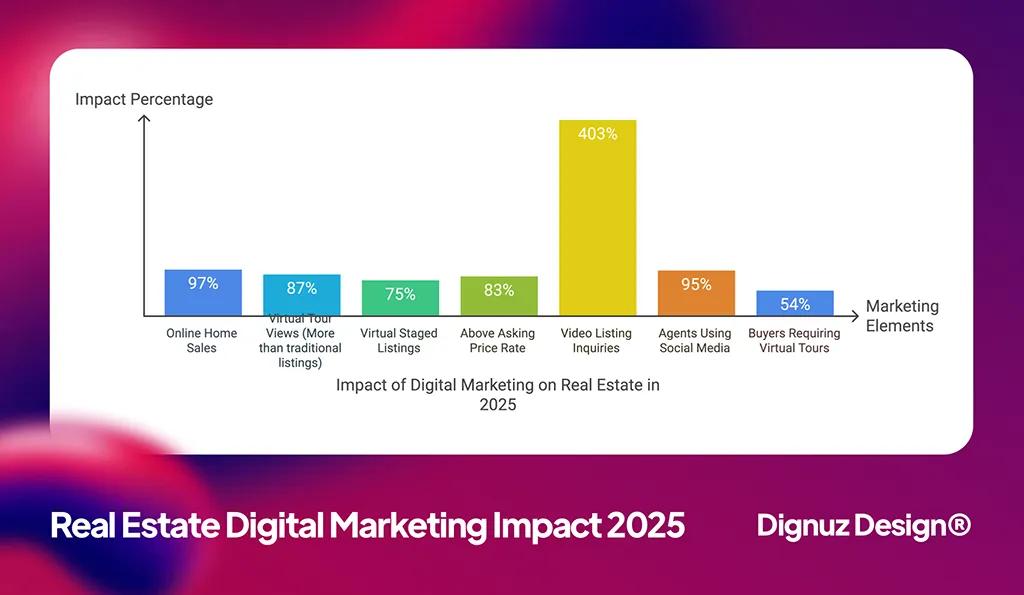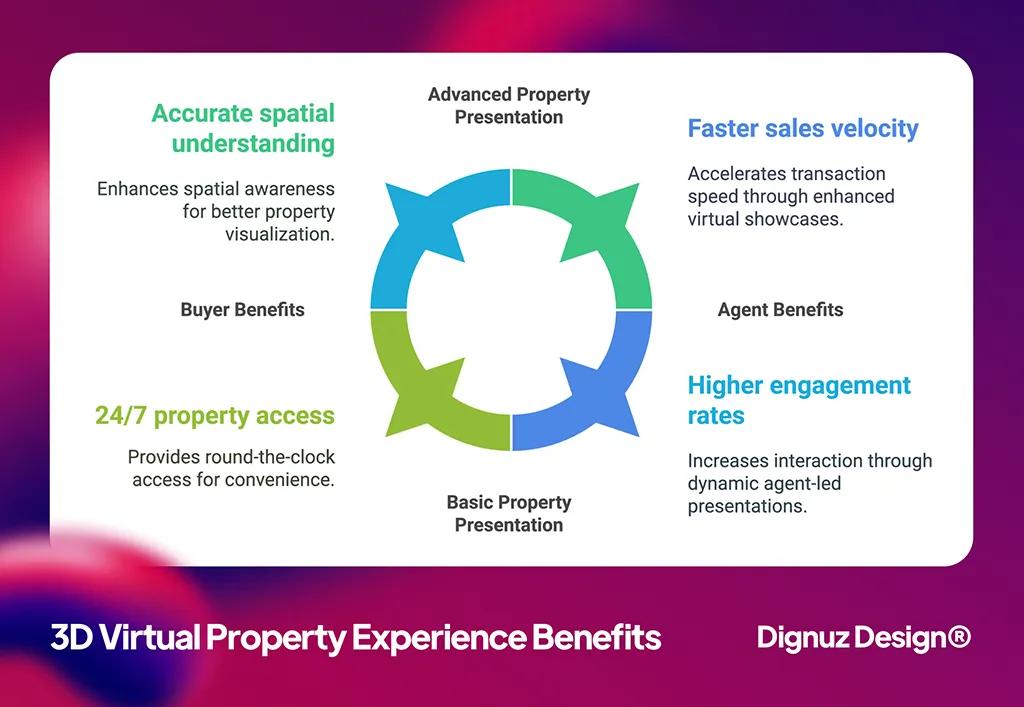Top Real Estate Marketing Trends to Watch in 2025

Digital transformation in real estate isn't just accelerating - it's redefining how properties are marketed and sold. With 97% of home sales now conducted online, mastering digital marketing isn't optional anymore (Source: ContentBase). For real estate professionals, staying ahead means embracing innovative digital strategies that capture attention and drive conversions in an increasingly competitive market.
Success in real estate marketing now depends on mastering real estate web development and digital presence optimization. From virtual tours to AI-powered lead nurturing, the tools and techniques that drive results are evolving rapidly. This guide breaks down the most impactful marketing trends that will shape real estate success in 2025.
Ready to transform your real estate marketing strategy? These data-backed trends will help you attract more qualified leads, showcase properties effectively, and close deals faster.
The Rise of Immersive Property Experiences
Virtual property tours and 3D experiences have revolutionized how buyers interact with listings. Properties showcased with virtual tours capture 87% more views than traditional listings (Source: AgentUp). This dramatic increase in engagement demonstrates buyers' growing preference for immersive digital experiences before scheduling in-person viewings.
Virtual Tours and 3D Visualization
Professional real estate 3D model creation enables potential buyers to explore properties on their own terms. Virtual tours offer several key advantages:
- 24/7 property access for potential buyers
- Detailed room-by-room exploration capabilities
- Accurate spatial understanding of the property
- Reduced time spent on unqualified showings
Virtual tours particularly resonate with tech-savvy buyers, who appreciate the convenience and detail these tools provide. The technology allows for comprehensive property exploration while saving time for both agents and potential buyers.
Professional Visual Content
High-quality visual content serves as the foundation of effective property marketing. Virtually staged listings sell 75% faster and are more likely to sell at or above asking price 83% of the time (Source: ElectroIQ). This significant impact on sales velocity demonstrates the crucial role of professional visual presentation in modern real estate marketing.
Professional Photography
- Impact on Property Marketing: 32% faster sales
Virtual Staging
- Impact on Property Marketing: 75% faster sales
3D Virtual Tours
- Impact on Property Marketing: 87% more views
Professional visual content goes beyond basic property photos. It creates an emotional connection with potential buyers, helping them envision themselves in the space. This emotional engagement often translates into faster sales and better offers.

Digital Marketing Automation and Personalization
Smart automation and personalization tools have transformed how real estate professionals nurture leads and close deals. AI-powered systems now provide personalized property recommendations, helping agents retain more clients and close deals faster (Source: ElectroIQ). Understanding these tools and their impact on digital marketing ROI is crucial for success in 2025.
Lead Nurturing Systems
Automated lead nurturing systems help maintain consistent communication with potential buyers while saving valuable time. These systems excel at:
- Sending personalized property recommendations based on browsing history
- Automating follow-up communications at optimal times
- Tracking engagement levels to identify hot leads
- Delivering relevant market updates to keep leads engaged
The key to successful automation lies in maintaining a personal touch while scaling your communication efforts. Modern systems achieve this through sophisticated behavior tracking and response mechanisms.
Data-Driven Marketing Decisions
Analytics and data tracking enable real estate professionals to make informed marketing decisions. Here's how different data points influence marketing strategies:
Property View Duration
- Marketing Impact: Indicates listing interest level
Click-through Rates
- Marketing Impact: Measures ad effectiveness
Lead Response Time
- Marketing Impact: Optimizes communication timing
Conversion Tracking
- Marketing Impact: Identifies successful strategies
By leveraging these data points, real estate professionals can optimize their marketing spend and focus on strategies that deliver the best returns. This data-driven approach ensures marketing efforts remain cost-effective while maximizing impact.
Cost-Effective Digital Marketing Strategies
Strategic digital marketing doesn't always require substantial investment. Property listings with video content receive 403% more inquiries than those without (Source: CBRE). Understanding effective real estate marketing on YouTube and other digital platforms can dramatically improve visibility while maintaining budget efficiency.
Social Media Marketing Evolution
Social media platforms continue to offer some of the most cost-effective marketing opportunities for real estate professionals. The key lies in understanding platform-specific strategies:
- Instagram: Focus on visual storytelling and property highlights
- Facebook: Leverage targeted advertising and community engagement
- LinkedIn: Connect with commercial real estate clients and investors
- TikTok: Create engaging property walkthrough videos
Success on social media requires consistency and content optimization. Each platform offers unique advantages for reaching different segments of your target audience.
Website Optimization Techniques
A well-optimized website serves as the foundation of cost-effective digital marketing. Consider these essential elements:
Mobile Responsiveness
- Business Impact: Captures 89% of mobile property searches
Fast Loading Speed
- Business Impact: Reduces bounce rates by up to 40%
Clear Call-to-Actions
- Business Impact: Improves lead generation effectiveness
Property Search Features
- Business Impact: Enhances user experience and engagement
Effective website optimization combines technical excellence with user experience considerations. This dual focus ensures your digital presence works efficiently to convert visitors into leads while maintaining cost-effectiveness.
Pro Tip: Focus on creating high-quality, evergreen content that continues to generate leads long after publication. This approach maximizes your return on investment while building lasting digital assets.

Relationship-Driven Digital Approaches
Building meaningful connections in the digital space has become crucial for real estate success. Nearly 95% of successful real estate agents now use social media to build and maintain client relationships (Source: ElectroIQ). Creating a strong online presence through luxury real estate website design and strategic content helps establish authority and trust in your market.
Building Online Authority
Establishing digital authority requires a multi-faceted approach that combines professional presentation with valuable content:
- Regular market updates and property insights
- Educational content about buying and selling processes
- Local area expertise and community information
- Client success stories and testimonials
The key to building authority lies in consistently delivering value while maintaining professional standards across all digital touchpoints. This approach helps establish trust and credibility with potential clients.
Collaborative Marketing
Strategic partnerships and co-marketing initiatives can significantly expand your digital reach. Consider these collaborative opportunities:
Local Businesses
- Marketing Benefits: Community credibility and referral networks
Home Service Providers
- Marketing Benefits: Expanded content opportunities and shared audiences
Financial Services
- Marketing Benefits: Enhanced value proposition for clients
Interior Designers
- Marketing Benefits: Improved property presentation and staging
Successful collaborations create win-win situations where partners share resources and audiences while providing enhanced value to clients. This approach maximizes marketing impact while maintaining cost efficiency.
Expert Insight: Focus on building genuine relationships through digital channels rather than purely promotional content. Share your expertise, engage with your community, and provide real value to establish lasting connections.

💻 Let us help you create a stunning online showcase for your projects that works seamlessly across all devices. Ready to amplify your real estate business? 👉 Explore AmplyViewer now
Frequently Asked Questions About Real Estate Marketing Trends
Understanding how to implement these marketing trends effectively is crucial for real estate development marketing success. Here are answers to the most common questions about adopting these strategies.
What is the minimum budget needed to implement these digital marketing trends?
Digital marketing strategies can be implemented incrementally based on your budget. Start with essential elements:
- Professional website optimization
- Basic virtual tour capabilities
- Social media presence
- Email marketing automation
Prioritize investments that offer the highest ROI for your specific market and client base. Many digital tools offer scalable pricing options that grow with your business.
How important are virtual tours for property marketing in 2025?
Virtual tours have become essential in modern real estate marketing. Consider that 54% of home buyers now refuse to schedule a showing without first viewing a virtual tour (Source: AgentUp). This technology is no longer optional for competitive real estate marketing.
Which digital marketing skills should real estate professionals focus on developing?
Key skills to develop include:
- Content creation and optimization
- Social media management
- Basic video production
- Data analysis and interpretation
- Digital advertising management
How can real estate professionals measure their digital marketing success?
Track these essential metrics
Website Traffic
- What It Measures: Overall digital presence effectiveness
Lead Conversion Rate
- What It Measures: Marketing strategy effectiveness
Engagement Metrics
- What It Measures: Content relevance and appeal
Time to Sale
- What It Measures: Overall marketing efficiency
How often should digital marketing strategies be updated?
Review and adjust your digital marketing strategies quarterly while monitoring performance metrics monthly. This approach allows you to stay current with market trends while maintaining consistency in your marketing efforts.
Taking Your Real Estate Marketing to the Next Level
The digital transformation of real estate marketing continues to accelerate as we approach 2025. With 97% of home sales conducted online and virtual tours generating 87% more views, the importance of a strong digital presence cannot be overstated. Success in this evolving landscape requires a strategic combination of immersive experiences, automated solutions, and relationship-driven approaches.
Key Action Steps for Implementation
- Audit your current digital presence and identify gaps
- Prioritize visual content creation and virtual tour capabilities
- Implement automated lead nurturing systems
- Develop a consistent content strategy across all platforms
- Track and analyze performance metrics regularly
The future of real estate marketing lies in creating seamless digital experiences that connect with buyers on a deeper level. By implementing these trends strategically, you can enhance your marketing effectiveness while maintaining cost efficiency.
Ready to transform your real estate marketing strategy? Explore our AmplyViewer pricing options to create immersive property experiences that capture and convert more leads.
Final Thoughts
Success in real estate marketing requires staying ahead of digital trends while maintaining a focus on relationship building and value delivery. By combining innovative technology with strategic implementation, you can create a marketing approach that drives results in 2025 and beyond.


